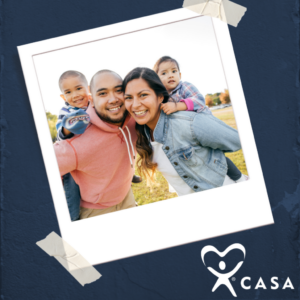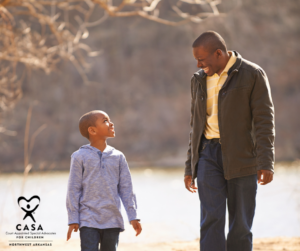Every child deserves a safe, loving, and permanent home. Yet, across the country, thousands of children experience abuse and neglect, leaving them vulnerable and in need of advocacy. April is Child Abuse Prevention Month, a time to shine a light on this critical issue and recognize the role each of us can play in protecting children and supporting families. One powerful way to make a difference is through the work of Court Appointed Special Advocates (CASA) volunteers like those at CASA of NWA.
The Power of Prevention Child abuse and neglect are not just heartbreaking realities—they are preventable. Strengthening families, providing resources, and raising awareness can reduce the risk factors that lead to abuse. Prevention efforts focus on supporting parents, ensuring access to mental health and substance abuse treatment, promoting positive parenting practices, and fostering strong community networks that help families thrive.
CASA Volunteers: A Voice for the Most Vulnerable When a child enters the foster care system due to abuse or neglect, the journey can be overwhelming. This is where CASA volunteers step in. These trained volunteers advocate for a child’s best interests, ensuring they receive the support, stability, and services they need. CASA volunteers provide consistency in a system where children often experience frequent changes in caseworkers, foster placements, and schools.
CASA volunteers work closely with caregivers, teachers, medical professionals, and caseworkers to make informed recommendations to the court about what is best for the child’s future. Their advocacy helps children find safe, permanent homes more quickly and reduces the trauma of prolonged instability.
How You Can Help Preventing child abuse and supporting children in foster care is a community effort. This April, consider how you can be part of the solution:
- Become a CASA Volunteer – By dedicating time to advocate for a child, you can change a life. Click here to read more about how to become a CASA volunteer.
- Support CASA Programs – Donate, share our content on Facebook, Instagram, and LinkedIn, or invite a friend or family member to attend a CASA 101 Information Session.
- Raise Your Voice – Talk to your friends, neighbors, and community leaders about the importance of preventing child abuse and supporting vulnerable children.
- Lend a Hand to Parents – Check in with families, share helpful resources, or simply be a listening ear to those navigating tough times.
Child abuse prevention is everyone’s responsibility. CASA volunteers play a vital role in ensuring that children who have already experienced harm are not lost in the system but instead have a dedicated advocate by their side. This April, let’s commit to protecting children, strengthening families, and creating a future where every child is safe and supported.
 Black History Month. These suggestions highlight the expanse of Black voices and their invaluable contributions to literature and society.
Black History Month. These suggestions highlight the expanse of Black voices and their invaluable contributions to literature and society. with an extra measure of joy, our CASA kids can also have an extra measure of heartache if they’re spending the holiday season far from home.
with an extra measure of joy, our CASA kids can also have an extra measure of heartache if they’re spending the holiday season far from home.




 October is here! It’s finally (and hopefully) time for cooler weather, corn mazes, pumpkin carving, warm drinks, and sleeping with the windows open. Additionally, the month of October offers several opportunities to celebrate diversity and bring awareness to issues of inclusion and equity in our community, with Indigenous People’s Day on October 9, National Coming Out Day on October 11, and the conclusion of Hispanic Heritage Month on October 15.
October is here! It’s finally (and hopefully) time for cooler weather, corn mazes, pumpkin carving, warm drinks, and sleeping with the windows open. Additionally, the month of October offers several opportunities to celebrate diversity and bring awareness to issues of inclusion and equity in our community, with Indigenous People’s Day on October 9, National Coming Out Day on October 11, and the conclusion of Hispanic Heritage Month on October 15.